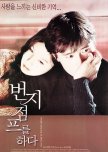Love is love ?
South Korea began transitioning to a democratic regime only in the 1980s, and my hypothesis is that the process itself took many years and likely still continues. In the 2000s, they really started to flourish and seemingly express a kind of Western defiance, which, in my opinion, infiltrated at least the film industry in a recognizable way. This movie, in my view, displays those markers, as if you're traveling back in time to the Hollywood of the 1980s in the United States.
The desire to convey a defiant idea that "love is love," unrelated to age or sexual identity, was successfully emotional and managed to deliver the message in its unsophisticated way. It was also very direct, typical of those years when there was a certain innocence and naivety, and everything was spoon-fed.
That is, the character whose soul was transmigrated spoke the same sentences and heard the same music at a level of 100 percent, not just hints here and there. Moreover, there was a lot of caution not to show any intimacy between the two characters(Second round), due to the period it was filmed.
In my opinion, it still holds up even though 23 years have passed, but on the other hand, it's very easy to judge this movie now because we are in a different era where things could have been a bit more blunt.
That is, if they had shown us a romantic scene between the two characters in the second reincarnation, it could have been bold for an even earlier time while still maintaining the same flame to this day.
Many of the things said by the male protagonist's classmates could not pass today's censorship filter, what is known as political correctness. After all, it's permissible to say these things only in class, but heaven forbid depicting them in a fantasy movie scene. Blunt remarks that men would make about women, which are still made today albeit censored, manage to induce a sort of internal cringe because this censorship has become part of our consciousness.
The same goes for other aspects in the movie, such as age differences. In the 2000s, this wasn't relevant and wasn't censored in South Korea. From the modern viewer's perspective, people who watch this and criticize the movie may not be aware that the era was different, and such things were accepted as part of the culture.
The desire to convey a defiant idea that "love is love," unrelated to age or sexual identity, was successfully emotional and managed to deliver the message in its unsophisticated way. It was also very direct, typical of those years when there was a certain innocence and naivety, and everything was spoon-fed.
That is, the character whose soul was transmigrated spoke the same sentences and heard the same music at a level of 100 percent, not just hints here and there. Moreover, there was a lot of caution not to show any intimacy between the two characters(Second round), due to the period it was filmed.
In my opinion, it still holds up even though 23 years have passed, but on the other hand, it's very easy to judge this movie now because we are in a different era where things could have been a bit more blunt.
That is, if they had shown us a romantic scene between the two characters in the second reincarnation, it could have been bold for an even earlier time while still maintaining the same flame to this day.
Many of the things said by the male protagonist's classmates could not pass today's censorship filter, what is known as political correctness. After all, it's permissible to say these things only in class, but heaven forbid depicting them in a fantasy movie scene. Blunt remarks that men would make about women, which are still made today albeit censored, manage to induce a sort of internal cringe because this censorship has become part of our consciousness.
The same goes for other aspects in the movie, such as age differences. In the 2000s, this wasn't relevant and wasn't censored in South Korea. From the modern viewer's perspective, people who watch this and criticize the movie may not be aware that the era was different, and such things were accepted as part of the culture.
Was this review helpful to you?





